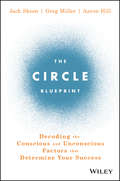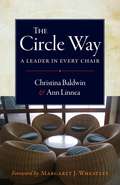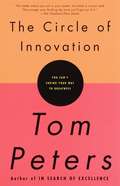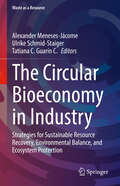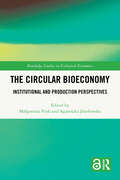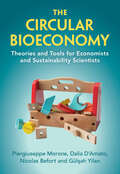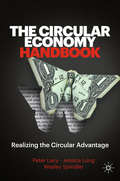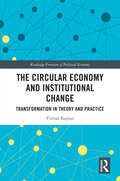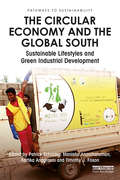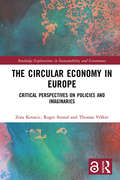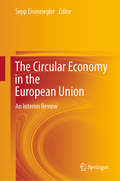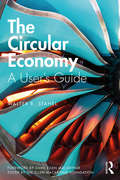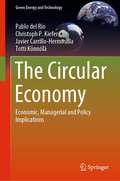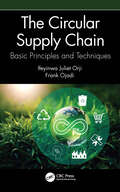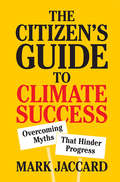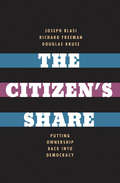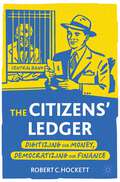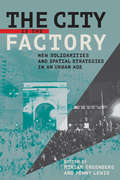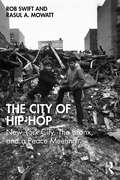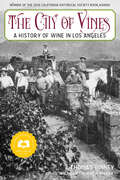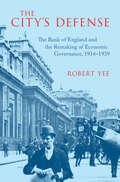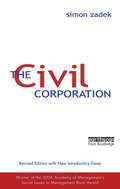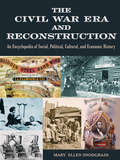- Table View
- List View
The Circle Blueprint: Decoding the Conscious and Unconscious Factors that Determine Your Success
by Greg Miller Aaron Hill Jack SkeenA roadmap to fulfillment, with practical tools for the journey The Circle Blueprint is your personal guide to fulfillment. Are you thriving or just surviving? Are you energized, balanced, and happy? This book helps you dig to the root of the problem, and gives you a roadmap for getting your life on a more positive trajectory. You’ll begin with an honest assessment of your current situation, and the life choices that got you there; this is your Circle, and through it, almost anything becomes possible. Your Circle can be adjusted—expanded, narrowed, balanced, or thrown off-kilter—to steer your life where you want it to go. Your Circle must be tended to, and whether you realize it or not, you make these choices every single day. This book helps you define your Circle, master it, and create the life you want to live. Finding satisfaction doesn’t mean starting a whole new life, it means reshaping the one you have to keep what’s working and adjust what’s holding you back. This book gives you the tools and insight you need to make the journey, with practical exercises to guide you through each step of the way. Think about how your life choices affect your emotional well-being Map your existing Circle to your current levels of life satisfaction Expand and balance your Circle to align more closely to your vision Discover the fulfillment of living life with purpose Wanting more doesn’t mean not liking what you have, it’s simply an acknowledgment that there is room for improvement. Change is not only possible; it’s often inevitable—but it’s up to you to dictate the course of these changes. The Circle Blueprint helps you chart your path, and gives you the tools you need to reach that destination.
The Circle Way: A Leader in Every Chair
by Christina Baldwin Ann LinneaAn authoritative and accessible guide to this foundational form of collaborative decision-making Uses images, stories and step-by-step instructions to teach the basics of circle and explore it’s deeper meanings Written by two pioneers in reviving, standardizing and popularizing circle process More and more organizations are looking for alternatives to rigid, top-down hierarchy. Even the most old-school now realize that good ideas can come from anywhere and that fostering collaboration and group cohesion is vital to any healthy enterprise. But what approach can best create an environment that ensures clear speaking, compassionate listening, and the making of well-grounded decisions? The most ancient one: the circle. The circle was the form of original gathering that taught human beings how to create social patterns. All modern group processes open to collaboration or to flattening the hierarchy are based in some way on circle practices. Here two veteran practitioners offer a comprehensive guide to this foundational form of human interaction The Circle Way lays out the basics of circle conversation based on the original work of the coauthors, who have studied and standardized the essential elements of circle practice and have been implementing them in a variety of organizations for over fifteen years. It opens with a unique visual guide to circle and then presents both structure and story so that readers understand how these elements come into play and how they are interrelated and interactive. Baldwin and Linnea include detailed instructions and suggestions for getting started, setting goals, and solving conflicts. And they delve into the deeper aspects of circle, illuminating the profound transformation the process has on people who participate in it.
The Circle of Innovation: You Can't Shrink Your Way to Greatness
by Tom PetersTom Peters--brilliant, original, and perhaps the most inspiring and listened-to business thinker of our time--has a lot on his mind these days. And he wants to share it in The Circle of Innovation. The world of business is in a permanent state of flux, he argues, a state of chaos in which constant innovation is the only survival strategy--for the individual and for the organization. And he presents here a lifesaving handbook--both provocative and practical--designed to turn any organization into a perpetual innovation machine.In 400 seminars in 47 states and 22 countries in the last five years, Peters has reexamined, refined, and reinvented his views on innovation. Now he brings those seminars--and his passion--to the reader in a landmark book. It is meant, he writes, to both "terrify" and "enlighten." These are "times of matchless peril for those who fail to grasp the nettle...and times of matchless opportunity for those who do."To keep us alert, limber, and ready for action, he provokes and cajoles in chapter after chapter. Among his institutions and revelations:We Are All Michelangelos. He shows how to transform every "jobholder" into a full-fledged businessperson.All Value Comes from the Professional Services. How to convert sluggish staff units into Vital Centers of Intellectual Capital Accumulation.The System is the Solution. How to build great systems--which go far beyond nuts and bolts.Create Waves of Lust. Quality is not the automatic advantage it recently was. There is a pressing need to reverse the rising tide of product and service "commoditization."Tommy Hilfiger Knows. In a crowded marketplace, branding is far more important than ever before.It's a Woman's World. How to capitalize on the fact that women purchase/are purchasing agents for well over half of U.S. commercial and consumer goods.Little Things Are the Only Things. As the Blight of Sameness encroaches on market after market, design is often the best tool in services or manufacturing for sustainable differentiation.We're Here to Live Life Out Loud. Why transformational leaders of the future must have laser-like focus, tell the truth, and live on the lunatic fringe.The hallmarks of Tom Peters legend are an insatiable curiosity, an agile intellect, a pragmatic perspective, and an uncanny ability to gauge the global zeitgeist. These qualities are all brought to bear as Peters sets out to engage, enrage, and ultimately empower his readers, amid forces that are reshaping not only business but every aspect of human experience.
The Circular Bioeconomy in Industry: Strategies for Sustainable Resource Recovery, Environmental Balance, and Ecosystem Protection (Waste as a Resource)
by Alexander Meneses-Jácome Ulrike Schmid-Staiger Tatiana C. Guarín C.This book serves as a starting point for readers to understand the concepts of the circular economy and bioeconomy and how they can be applied to industrial processes. The notion of having eco-friendly industries is a recent development, with a growing interest in the environmental impact of industrial practices, particularly with regard to resource recovery practices for valuable nutrients and byproducts, which aligns with the circular economy and bioeconomy concepts that aim to establish a "continuous flow of materials." Currently, the focus is on studying the environmental impact and developing strategies to achieve a balance with water ecosystems for sustainable and equitable coexistence. The success of these concepts will depend on a robust framework that evaluates the environmental trade-offs and co-benefits of improving industry practices to enhance ecosystem protection. This book introduces circular economy practices in industry, along with tips, procedures, recommendations, and lessons learned.
The Circular Bioeconomy: Institutional and Production Perspectives (Routledge Studies in Ecological Economics)
by Małgorzata Pink Agnieszka JózefowskaFounded on distinct principles to the fossil fuel-based, linear economy, the sustainable, circular bioeconomy requires different social values and institutions and a better understanding of the complexity of the production process. A circular bioeconomy provides a framework for using renewable natural capital to manage land, biodiversity, food, and other industries, with the aim of improving social well-being and environmental safety.The contributors to this book analyse the evolution of the economic system towards the circular economy and bioeconomy and its place in the paradigm of sustainable development. They look at institutions and their importance for the bioeconomy and examine the question of the behaviour of market entities – enterprises and consumers – as well as the meaning of social and environmental responsibility for these entities. They also discuss the issues of the product itself: the process of creation, production, processing and the quality of the product, including its environmental impact throughout its life cycle. The authors also refer to the potential pitfalls and threats related to the implementation of the bioeconomy in both socio-economic and environmental contexts. Individual processes and phenomena are illustrated with case studies and the authors' own research.The book deliberately fosters an interdisciplinary approach founded on cooperation between economists, management specialists, agronomists, biotechnologists, chemists and soil scientists, who together underline the complexity and importance of the interdependence of the economy, society and the natural environment.
The Circular Bioeconomy: Theories And Tools For Economists And Sustainability Scientists
by Piergiuseppe Morone Dalia D’Amato Nicolas Befort Gülşah YilanThe Circular Economy Handbook: Realizing the Circular Advantage
by Jessica Long Peter Lacy Wesley SpindlerCan we align global production and consumption systems with sustainability? Can business growth actually lead to a healthier planet? Can companies innovate through the circular economy to create competitive advantage and genuine impact? Waste to Wealth proved that the emerging circular economy advantage exists – now Lacy, Long and Spindler show you how to realize it at speed and scale in The Circular Economy Handbook. We stand at a crossroads, with rising geopolitical and geo-economic tensions, massive technological change and a host of social and environmental challenges. We are pushing planetary boundaries to their limits, with climate change and threats to biodiversity and oceans as just a few examples. Significant impacts are already being felt, and both people and planet face potentially catastrophic and irreversible consequences if we don’t urgently change our global model and systems. Our current linear “take, make, waste” models of production and consumption will not be sustainable in a world of some 9 billion people by 2050, especially with ever-expanding rates of consumption. Thriving within these dynamics demands more than incremental adjustments to business-as-usual. The circular economy offers a powerful means to decouple growth from use of scarce and harmful resources, enabling greater production and consumption with fewer negative environmental impacts—at the same time, making companies more innovative and competitive. In fact, this book shows that $4.5 trillion in economic value is at stake. Delivering on the promise of a circular economy demands impact and scale, extending through value chains and, ultimately, disrupting the entire economic system. In The Circular Economy Handbook, the authors illuminate the path from insight to action, from linear to circular. With case studies, advice and practical guidance, they show leaders how to pivot towards a holistic circular organization, embedding circularity internally and delivering broad-based system change. With unique insights across business models, technologies, and industries – featuring stories and real-world examples from circular pioneers – this book is the essential guide to help companies become leaders in the movement to secure the circular economy advantage.
The Circular Economy and Institutional Change: Transformation in Theory and Practice (Routledge Frontiers of Political Economy)
by Yilmaz KaplanThe climate crisis has emerged as a consequence of the linear economic system that developed in the aftermath of the Industrial Revolution. In recent years, global actors have recognised the need for institutional change from the linear economy to a more sustainable alternative: The circular economy.This book analyses the potential for transformative institutional change to a circular economy, both in theory and in practice. At the theoretical level, the book evaluates the feasibility of transitioning from a linear economy system to a circular economy by drawing on the principles of New Institutionalism. It thoroughly examines the key parameters of institutional change, focusing on the role of actors and new ideas within the institutional change process. Building upon this theoretical framework, the book then delves into the practical implementations of key actors. It first explores the role of the state and the market as crucial institutional actors, referencing the historical debate between these two entities. Additionally, the book critically assesses the agenda-setting power of influential international organisations, specifically the United Nations and the World Trade Organization, in driving a circular institutional change. Furthermore, it analyses the circular economy policies of influential global actors such as the European Union, China, Japan, and the USA. Aligned with these analyses, the book also examines the potential of a circular institutional change to bring about a paradigm shift from the prevailing industrial and consumer-centric society to an ecologically oriented society.This book is invaluable for readers interested in the circular economy, new institutionalism, the impacts of climate change, and alternative economic policy.
The Circular Economy and the Global South: Sustainable Lifestyles and Green Industrial Development (Pathways to Sustainability)
by Patrick Schröder Manisha Anantharaman Kartika Anggraeni Timothy FoxonThe circular economy is a policy approach and business strategy that aims to improve resource productivity, promote sustainable consumption and production and reduce environmental impacts. This book examines the relevance of the circular economy in the context of developing countries, something which to date is little understood. This volume highlights examples of circular economy practices in developing country contexts in relation to small and medium enterprises (SMEs), informal sector recycling and national policy approaches. It examines a broad range of case studies, including Argentina, Brazil, China, Colombia, India, Indonesia, Kenya, South Africa, and Thailand, and illustrates how the circular economy can be used as a new lens and possible solution to cross-cutting development issues of pollution and waste, employment, health, urbanisation and green industrialisation. In addition to more technical and policy oriented contributions, the book also critically discusses existing narratives and pathways of the circular economy in the global North and South, and how these differ or possibly even conflict with each other. Finally, the book critically examines under what conditions the circular economy will be able to reduce global inequalities and promote human development in the context of the Sustainable Development Goals. Presenting a unique social sciences perspective on the circular economy discourse, this book is relevant to students and scholars studying sustainability in economics, business studies, environmental politics and development studies.
The Circular Economy in Europe: Critical Perspectives on Policies and Imaginaries (Routledge Explorations in Sustainability and Governance)
by Zora Kovacic Roger Strand Thomas VölkerThe Circular Economy in Europe presents an overview and a critical discussion on how circularity is conceived, imagined, and enacted in current EU policy-making. In 2013, the idea of a circular economy entered the stage of European policy-making in the efforts to reconcile environmental and economic policy objectives. In 2019 the European Commission declared in a press release that the Circular Economy Action Plan has been delivered. The level of circularity in the European economy, however, has remained the same. Bringing together perspectives from social sciences, environmental economics and policy analysis, The Circular Economy in Europe provides a critical analysis of policies and promises of the next panacea for growth and sustainability. The authors provide a theoretical and empirical basis to discuss how contemporary societies conceive their need to re-organise production and consumption and explores the messy assemblage of institutions, actors, waste streams, biophysical flows, policy objectives, scientific disciplines, values, expectations, promises and aspirations involved. This book is essential reading for all those interested in understanding how ideas about the circular economy emerged historically, how they gained traction and are used in policy processes, and what the practical challenges in implementing this policy are.
The Circular Economy in the European Union: An Interim Review
by Sepp EisenrieglerThe implementation of the circular economy will entail a major transformation from a resource-destroying, linear economy to a circular one that operates within the planet’s regenerative boundaries. This book presents an interim assessment of the implementation of a circular economy in the EU. It reveals what achievements have been made in various EU institutions, but which are scarcely perceived by the public; which basic scientific principles can be applied in this context; and what NGOs are demanding beyond this progress. It provides convincing arguments for abandoning the “hamster wheel” of material-based satisfaction of our needs, and shows that the primacy of the economy stands in the way of a good life for all. Given its focus, it will appeal to everyone interested in an ecologically sustainable economic system.
The Circular Economy: A User's Guide
by Walter R StahelA Circular Economy seeks to rebuild capital, whether this is financial, manufactured, human, social or natural, and offers opportunities and solutions for all organisations. This book, written by Walter Stahel, who is widely recognised as one of the key people who formulated the concept of the Circular Economy, is the perfect introduction for anyone wanting to quickly get up to speed with this vitally important topic for ensuring sustainable development. It sets out a new framework that refines the concept of a Circular Economy and how it can be applied at industrial levels. This concise book presents the key themes for busy managers and policymakers and some of the newest thinking on the topic of the Circular Economy from one of the leading thinkers in the field. Practical examples and case studies with real-life data are used to elucidate the ideas presented within the book.
The Circular Economy: Economic, Managerial and Policy Implications (Green Energy and Technology)
by Javier Carrillo-Hermosilla Pablo del Río Totti Könnölä Christoph P. KieferThis book provides an in-depth analysis of the concept of the Circular Economy (CE), as well as an assessment of the drivers and barriers for circular practices by firms, and its implications for managers in firms and public policy makers. It includes proposals for policy frameworks and instruments that will encourage the uptake of CE practices. The book is presented in three linked parts. The first part of the book provides a broad view of the topic, put into the wider context of sustainability. In the second part, the drivers of and barriers to the uptake of the CE are analysed, with a special focus on the micro-level not seen often in the previous studies on the CE. This book is of interest to researchers, policy makers and post-graduate students in areas such as environmental management and economics.
The Circular Supply Chain: Basic Principles and Techniques
by Ifeyinwa Juliet Orji Frank OjadiOrganizations need to stay competitive and transition from a linear make-use-dispose supply chain model to a sustainable one. This book covers techniques and basic principles, historical developments and recent issues facing the adoption of a circular supply chain model. The Circular Supply Chain: Basic Principles and Techniques presents the key principles and techniques for the effective integration of a circular economy into supply chains. It discusses sustainability, digitization and the application of blockchain to enhance operations within the realm of Industry 4.0. Principles to assist managers in effectively adopting circularity business models for sustainability improvements are provided, along with the historical background, so the reader can have a better understanding for implementation. Case studies and reading comprehension questions are also offered to help with the effective integration of a circular economy into supply chains. This book is written to assist students, practicing engineers and business professionals that work in the industrial and manufacturing sectors, supply chain management, and with advanced technologies associated with Industry 4.0, sustainability, blockchain and digitalization integration techniques of circular supply chains.
The Citizen's Guide to Climate Success: Overcoming Myths that Hinder Progress
by Mark JaccardSometimes solving climate change seems impossibly complex, and it is hard to know what changes we all can and should make to help. This book offers hope. Drawing on the latest research, Mark Jaccard shows us how to recognize the absolutely essential actions (decarbonizing electricity and transport) and policies (regulations that phase out coal plants and gasoline vehicles, carbon tariffs). Rather than feeling paralyzed and pursuing ineffective efforts, we can all make a few key changes in our lifestyles to reduce emissions, to contribute to the urgently needed affordable energy transition in developed and developing countries. More importantly, Jaccard shows how to distinguish climate-sincere from insincere politicians and increase the chance of electing and sustaining these leaders in power. In combining the personal and the political, The Citizen's Guide to Climate Success offers a clear and simple strategic path to solving the greatest problem of our times. A PDF version of this title is also available as Open Access on Cambridge Core at doi.org/10.1017/9781108783453.
The Citizen's Share
by Douglas L. Kruse Richard B. Freeman Joseph R. BlasiThe idea of workers owning the businesses where they work is not new. In America's early years, Washington, Adams, Jefferson, and Madison believed that the best economic plan for the Republic was for citizens to have some ownership stake in the land, which was the main form of productive capital. This book traces the development of that share idea in American history and brings its message to today's economy, where business capital has replaced land as the source of wealth creation. Based on a ten-year study of profit sharing and employee ownership at small and large corporations, this important and insightful work makes the case that the Founders' original vision of sharing ownership and profits offers a viable path toward restoring the middle class. Blasi, Freeman, and Kruse show that an ownership stake in a corporation inspires and increases worker loyalty, productivity, and innovation. Their book offers history-, economics-, and evidence-based policy ideas at their best.
The Citizens' Ledger: Digitizing Our Money, Democratizing Our Finance
by Robert C. HockettThis book is the first of its kind in several overlapping and rapidly developing fields that now dominate news headlines – among them the fields of crypto-currency, digital payments platforms, ‘fintech,’ and central bank digital currencies (‘CBDCs’). With crypto and fintech now threatening to transform finance in destabilizing and anti-democratic ways, and with China and other nations now digitizing their national currencies in the form of CBDCs that make the US dollar and national payments infrastructure look ever more quaint and outmoded, this book shows both why the US and other democratic commercial societies must, and how they can, democratically digitize their currencies, their national payments systems, and the authorities that respectively issue and administer them – in the US, the Federal Reserve System (‘the Fed’).
The City Is the Factory: New Solidarities and Spatial Strategies in an Urban Age
Urban public spaces, from the streets and squares of Buenos Aires to Zuccotti Park in New York City, have become the emblematic sites of contentious politics in the twenty-first century. As the contributors to The City Is the Factory argue, this resurgent politics of the square is itself part of a broader shift in the primary locations and targets of popular protest from the workplace to the city. This shift is due to an array of intersecting developments: the concentration of people, profit, and social inequality in growing urban areas; the attacks on and precarity faced by unions and workers' movements; and the sense of possibility and actual leverage afforded by local politics and the tactical use of urban space. Thus, "the city"—from the town square to the banlieu—is becoming like the factory of old: a site of production and profit-making as well as new forms of solidarity, resistance, and social reimagining.We see examples of the city as factory in new place-based political alliances, as workers and the unemployed find common cause with "right to the city" struggles. Demands for jobs with justice are linked with demands for the urban commons—from affordable housing to a healthy environment, from immigrant rights to "urban citizenship" and the right to streets free from both violence and racially biased policing. The case studies and essays in The City Is the Factory provide descriptions and analysis of the form, substance, limits, and possibilities of these timely struggles.ContributorsMelissa Checker, Queens College and the Graduate Center of the City University of New York; Daniel Aldana Cohen, University of Pennsylvania; Els de Graauw, Baruch College, City University of New York; Kathleen Dunn, Loyola University ChicagoShannon Gleeson, Cornell University; Miriam Greenberg, University of California, Santa Cruz; Alejandro Grimson, Universidad de San Martín (Argentina); Andrew Herod, University of Georgia; Penny Lewis, Joseph S. Murphy Institute for Worker Education and Labor Studies, City University of New York; Stephanie Luce, Joseph S. Murphy Institute for Worker Education and Labor Studies, City University of New York; Lize Mogel, artist and coeditor of An Atlas of Radical Cartography; Gretchen Purser, Maxwell School of Citizenship and Public Affairs, Syracuse University
The City of Care: Strategies to Design Healthier Places (Springer Series in Design and Innovation #26)
by Anna Anzani Francesco ScullicaThe book explores care as a transition strategy to a healthier and more sustainable world. After the lesson learned from the pandemic, health as a fundamental human right is increasingly related to a care component: caring for sick people, persons with disabilities, elders, migrants and refugees, women and children, caring for bodies, minds, cities and nature. Endorsing the care system as a female knowledge based on complexity, flexibility, management of the unexpected, sense of responsibility, the project culture can extract this paradigm from the domestic perimeter, bring outside and make it accessible to all in work, politics, relationships, places and communities. The systemic connection between planet and people wellbeing will be grasped through a transdisciplinary perspective that allows to deal with the city of care at a mental, physical, social and global level. The first section addresses care and interior space, dealing with dwelling, working, proximity and cities on a human scale, with a particular attention to the post Covid conditions. The second section deals with healthcare design, the evolution and trend of healing spaces, the influence of technology and robotics on inclusive design processes. The third section considers a social care attitude and deals with the multiethnic urban dimension, care and creativity in design, society and relationships, the right to health of immigrant people.
The City of Hip-Hop: New York City, The Bronx, and a Peace Meeting
by Rob Swift Rasul A. MowattThe City of Hip-Hop positions a unique conceptualization of the history of Hip-Hop, that it was a combination of forces that produced the environment for Hip-Hop to specifically grow in the geographies of New York City and its boroughs. This book argues it was the political forces of the 1970s combined with the economic forces of free market capitalism and privatization of public services, neoliberalism, and the social forces of the deindustrialization of major cities and displacement of populations that led the cultural creation of the “Boogie Down” Bronx. The City of Hip-Hop shows how Hip-Hop is a socio-political reaction that created an alternate reality with a geographic specificity, and it is the interplay with those forces that nurtured it to become the culture force that we know it today in New York, Philadelphia, Boston, Los Angeles, Chicago, London, Manchester, Liverpool, Berlin, São Paulo, Tokyo, Washington D.C., Seattle, Paris, Houston, Dallas, Miami, Atlanta, Detroit, Toronto, Cleveland, Johannesburg, Barcelona, Belfast, Gaza City, and elsewhere. Once those of us as fans of the culture zoom out to see such a bigger picture, a much-needed criticism and retelling of the culture and art of Hip-Hop emerges as our understanding.This book is essential for preservers of the culture, students, scholars, and general readers interested in urban planning, urban design, urban geography, place-making, American Studies, Cultural Studies, Black Studies, and Latin American Studies.
The City of Vines: A History of Wine in Los Angeles
by Thomas PinneyThe author of A History of Wine in America recounts the beginnings of California’s wine trade in the once isolated pueblo now called Los Angeles.Winner of the 2016 California Historical Society Book Award! With incisive analysis and a touch of dry humor, The City of Vines chronicles winemaking in Los Angeles from its beginnings in the late eighteenth century through its decline in the 1950s. Thomas Pinney returns the megalopolis to the prickly pear-studded lands upon which Mission grapes grew for the production of claret, port, sherry, angelica, and hock. From these rural beginnings Pinney reconstructs the entire course of winemaking in a sweeping narrative, punctuated by accounts of particular enterprises including Anaheim’s foundation as a German winemaking settlement and the undertakings of vintners scrambling for market dominance. Yet Pinney also shows Los Angeles’s wine industry to be beholden to the forces that shaped all California under the flags of Spain, Mexico, and the United States: colonial expansion dependent on labor of indigenous peoples; the Gold Rush population boom; transcontinental railroads; rapid urbanization; and Prohibition. This previously untold story uncovers an era when California wine meant Los Angeles wine, and reveals the lasting ways in which the wine industry shaped the nascent metropolis.
The City's Defense: The Bank of England and the Remaking of Economic Governance, 1914–1939 (Studies in Macroeconomic History)
by Robert YeeIn The City's Defense, Robert Yee examines how the City of London maintained its status as an international financial center. He traces the role of the Bank of England in restructuring the domestic, imperial, European, and international monetary systems in the aftermath of the First World War. Responding to mass unemployment and volatile exchange rates, the Bank expanded its reach into areas outside the traditional scope of central banking, including industrial policy and foreign affairs. It designed a system of economic governance that reinforced the preeminence of sterling as a reserve currency. Drawing on a range of archival evidence from national governments, private corporations, and international organizations, Yee reevaluates our understanding of Britain's impact on the global economic order.
The Civic Culture Transformed
by Russell J. Dalton Christian WelzelThis book reevaluates Almond, Verba, and Pye's original ideas about the shape of a civic culture that supports democracy. Marshaling a massive amount of cross-national, longitudinal public opinion data from the World Values Survey Association, the authors demonstrate multiple manifestations of a deep shift in the mass attitudes and behaviors that undergird democracy. The chapters in this book show that in dozens of countries around the world, citizens have turned away from allegiance toward a decidedly "assertive" posture to politics: they have become more distrustful of electoral politics, institutions, and representatives and are more ready to confront elites with demands from below. Most importantly, societies that have advanced the most in the transition from an allegiant to an assertive model of citizenship are better-performing democracies - in terms of both accountable and effective governance.
The Civil Corporation: The New Economy Of Corporate Citizenship
by Simon ZadekThe Civil Corporation is top draw reading for business professionals, management students and academics, activists and public servants. It goes to the heart of the issue of business in society, cutting through the rhetoric of campaigners and business-speak by framing the tough questions in balanced and yet provocative terms. Crucially, it connects an insightful vista of the broader landscape with a set of practical 'do's' that have stood the test of time. The book was awarded the prestigious Academy of Management's Social Issues in Management Book Award in 2006, confirming that Zadek has produced what every author aspires to: a classic book that is timely in its application.
The Civil War Era and Reconstruction: An Encyclopedia of Social, Political, Cultural and Economic History
by Mary Ellen SnodgrassThe encyclopedia takes a broad, multidisciplinary approach to the history of the period. It includes general and specific entries on politics and business, labor, industry, agriculture, education and youth, law and legislative affairs, literature, music, the performing and visual arts, health and medicine, science and technology, exploration, life on the Western frontier, family life, slave life, Native American life, women, and more than a hundred influential individuals.
